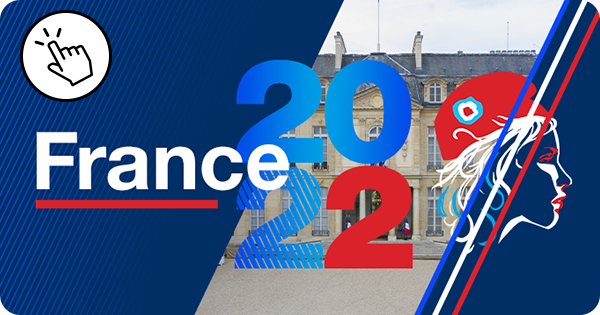Turnout concerns loom large for French presidential election frontrunners
Issued on:
With just over two weeks to go until the April 10 first round of France’s presidential election, candidates and experts alike are flagging the threat of historically low voter turnout after a race eclipsed by the war in Ukraine.
Observers differ on just how serious low turnout could prove in this race – and on which candidates could suffer most from voters staying home.
A recent poll by the BVA firm showed only 71 percent of those surveyed intended to cast a ballot in April’s election. In practice, that would mean a rate of abstention similar to the first round in 2002 – 28.4 percent – the all-time record for the opening round of France’s two-round presidential vote. The abstention rate was also considered high in 2017, when 22.2 percent of registered voters stayed away.
“One could say that 70 percent turnout is an honourable score,” Céline Braconnier, a professor of political science, told Philosophie Magazine last week. But “for many citizens – think about the 65 percent who abstained in the 2021 regional elections – the presidential election remains the last rampart against a complete break with voting. It’s that definitive separation that is worrisome”, she said.
The ins and outs of the French presidential election

Some are less concerned. “It’s true, there’s a risk of a drop in turnout in the presidential election for assorted reasons – the destruction of political parties on the one hand and the foregone conclusion that Macron is going to win on the other,” political analyst Gérard Grunberg told Agence France-Presse this week.
“Instead of turnout around 80 percent, as is usual for a presidential election, it could be around 70 percent; but I don’t think it would be a lot less, and that’s still a significant rate,” said Grunberg, a research director emeritus at France’s National Centre for Scientific Research (CNRS). He doesn’t believe the end of voter engagement is coming – “unlike most of my colleagues”.
>> France in Focus looks at the country’s abstention problem
Grunberg suggests voters are motivated by practical concerns when deciding whether to head to the polls. “People are more and more utilitarian. They vote when they are interested. And we know that the tighter [a race] is, the more people vote. So Emmanuel Macron’s presumptive victory is not mobilising people,” he said.
In the BVA poll, 40 percent of those intending to abstain from April’s election cited “the impression that the die is cast” to justify sitting this one out, almost on par with those who feel “the election will change nothing in their daily life” at 41 percent.
Who is most likely to sit out the vote?
Macron supporters are concerned that his would-be voters might be overconfident about the result. “Historically, it is already difficult to mobilise an outgoing administration’s electorate,” the pollster Bruno Jeanbart told the financial daily Les Echos this week.
Macron’s interior minister, Gérald Darmanin, seemed keen to sound the alarm on Thursday night, telling France 5 television: “Marine Le Pen is dangerous for the president. She can win this presidential election.”
Darmanin added: “She has a strategy that looks like it’s working. [Far-right rival Éric] Zemmour has made her [appear more] ‘soft’.”
The latest polls have Macron beating far-right National Rally leader Le Pen relatively comfortably, with between 54 and 59 percent of the vote should the two advance to the election’s April 24 run-off. That duel would be a re-match of the 2017 second round. But Macron scored far higher in their previous meeting, winning with 66.1 percent to Le Pen’s 33.9 five years ago.
>> How a quirk in French voter registration drives high abstention rate
Grunberg, for his part, believes Macron’s rivals are the ones who should worry. Low turnout “will benefit Macron even more because Macron’s electorate is pretty determined, especially in this period of simmering conflict. It’s the others who could be telling themselves: We don’t like Macron, but he’s going to win and we don’t know who to vote for”, the analyst said.
Demographics matter, too. Le Pen and far-left candidate Jean-Luc Mélenchon have support bases that are younger and more working class than those of the other top candidates. Those two groups have historically been harder to coax to the ballot box. Le Pen and Mélenchon, each waging a third consecutive bid for France’s top job, know the risks; both have been striving to boost turnout among their respective supporters.
“That’s one of the keys that could allow Jean-Luc Mélenchon to advance to the second round – if there is high working-class turnout. Because it’s the working classes who abstain, disgusted by everything and with the impression that no solution will be brought to bear on their problems in these elections,” Mélenchon spokesman Alexis Corbière told BFM TV on Thursday.
>> Tackling turnout: Amid record abstention in France, a look at how Europe gets out the vote
Peril looms elsewhere as well. The political consultant and Sciences Po professor Philippe Moreau Chevrolet on Thursday pointed to yet another factor that could thin the queues at the ballot box: Ten days after the French government lifted most of the country’s Covid-19 protections, including its vaccine pass and indoor masking requirements, confirmed cases have surged to a daily average of 110,000 nationwide.
“A proliferation of Covid cases – [at] kids’ schools, work, friends… – but whatever happens let’s take the mask off,” Moreau Chevrolet quipped in a tweet. “At this rate, the number one cause of abstention on April 10 will be Covid.”
(With AFP)

For all the latest health News Click Here

